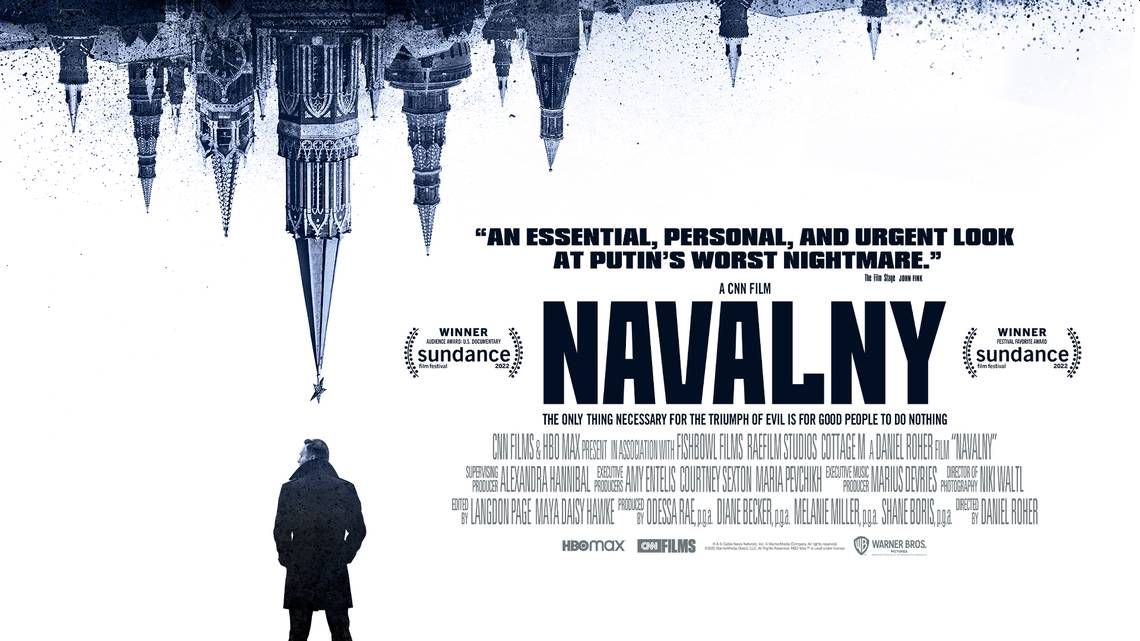Doc Corner: 'Navalny' is the first Oscar contender of '22
 Thursday, May 5, 2022 at 1:00PM
Thursday, May 5, 2022 at 1:00PM By Glenn Dunks

What luck it is to be a filmmaker in the room at such moments of historic opportunity. Canadian director Daniel Roher has made one previous feature, a music bio-doc about The Band, which probably isn’t the sort of bellwether for somebody who is about to capture evidence of the plot to assassinate the political rival of Vladimir Putin. But here we are.
Because of that luck and whatever directorial smarts got him there, Roher and his film Navalny are surely very real contenders for the documentary Oscar, the first such major title of the year.
It can’t have been easy to have procured such access to somebody like Alexey Navalny. It’s not just a whim that brings you to Russia on the trail of the man who has become Putin’s unlikely opposition and enemy. I have not seen his aforementioned predecessor Once Were Brothers: Robbie Robertson and the Band, but Roher appears to be a talented filmmaker. He demonstrates fine technical abilities and builds strong narrative rhythms with editors Maya Hawke and Landgon Page who seamlessly criss-cross between Roher’s own footage shot by Niki Waitl and that of video filmed by others.
Still, I think it’s fair to say that Navalny wouldn’t quite be garnering the attention it has (including the audience award at Sundance) without one of the most incredible scenes audiences will likely see all year in documentary. What luck!

It’s scenes like those in question—where Navalny himself expertly plays at eliciting a confession to his own 2020 nerve poisoning that occurred on a flight from Siberia to Moscow—that make me forgive the rather easy and usually rather tired tactic of playing much of the film “just like a thriller”. Because it is at times like something we might expect to see in a Jack Ryan movie. In fact, Navalny even suggests Roher do just that. It is afterall a political whodunnit nestled within a campaign movie about human rights, which may not sound exciting, but it is. Some viewers may already know the outcome if it peaked out from all of the other news that was happening that year, but even if you do, the access to Navalny that Roher is granted makes this a compelling watch nonetheless that entertains as much as it shocks and reveals about the catastrophic failure of democracy in the borders of Russia (even more so than we can already see).
Beyond its centerpiece, the movie begins and ends with the question of legacy. It’s an interesting concept that Navalny himself doesn’t quite allow himself to enter into beyond political platitudes. However, it does recognise early that he is a man who has certain ideas about politics and the role of politicians within it that run counter to how Russia has been governed for generations. That he finds himself where he is is entirely preposterous and he recognises as much and this gives the film a friction that isn’t all that common within this sphere of polico-docs.

That the film doesn’t interrogate him with more vigour, particularly in his dealings with the likes of neo-nazis (mutual enemies can create curious bedfellows) is its most disappointing element. Content as it sometimes is with draping him in a saintly glow. But within Navalny is a fascinating glimpse at a very modern politician who is in the grips of tearing down the myth of one leader while simultaneously attempting to build the myth of himself. And all while working within the troubled mechanics of Russia.
He’s an interesting character who knows the seemingly insurmountable mission ahead of him. He positions himself as a man of the people, but how do you do that when you’re allowed to be with or even be seen (in most cases) by the people. That the film was made before the Russian invasion of Ukraine yet is released in the shadow of it cannot be ignored. Many will find much alike in Navalny and Ukrainian president Volodymyr Zelenskyy. Perhaps rightly, although their stories diverge in very significant ways. Even within the horrors that they experience, there is a quality to both that appeals to audiences. Navalny knows his appeal and so does Roher. Both capitalise on his charm and good looks. Which is good news for us because to not do so wouldn’t make a terribly interesting film. This is a really strong movie—the result of a lot of different factors and a bit of luck.
Release: It is streaming on CNN in the United States, I think, but who really knows anymore with the collapse of CNN+? Alternatively, it’s Spectrum On Demand and Sling TV. In the UK, it’s streaming on BBC iPlayer and can be rented on all sorts of platforms.
Awards chances: I would be shocked if it wasn’t nominated for the Oscar. A win could be very likely, although two years in a row the winner has been a particularly crowd-pleasing effort and, well, Navalny doesn’t exactly end happily. But, last year’s winner, Summer of Soul, won the same audience prize at Sundance. Also, you know, it’s only May. Still, you could hardly get a relevant film for Oscar voters to coronate.
 Best Documentary,
Best Documentary,  Doc Corner,
Doc Corner,  Navalny,
Navalny,  Review,
Review,  Russia,
Russia,  documentaries
documentaries 

